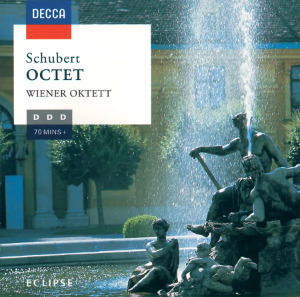
Franz Schubert (1797-1828)
Octet for clarinet, horn, bassoon, string quartet and double bass in F major, D803 (1824)
Minuet and Finale for wind octet, D72
Wiener Oktett (Octet)
Wiener Bläsersolisten (Minuet)
rec. 1990, Mozartsaal, Konzerthaus, Vienna, Austria
Presto CD
Decca 448 715-2 [72]
I opened my review four years ago of the Wigmore Soloists’ recording of the Octet on BIS with these remarks: “Many people’s favourite version of Schubert’s Octet will be the famous recording by Willi Boskovsky and the Vienna Octet but that is well over sixty years old, and while the sound James Brown and John Culshaw gave Decca was excellent for its era, it inevitably now sounds a little muddy compared with the clarity and brilliance of this new, very-well-engineered digital issue.” The same observation is true regarding this recording which, although now thirty-five years old, was recorded in best digital sound and was the previous top recommendation when BBC Record Review surveyed it before they recently revisited the work and Tamsin Little chose the version on the Avi label. Surprisingly, I cannot see that it has ever been reviewed here on MusicWeb.
As with all more modern recordings, the exposition repeat in the first movement is taken here and includes the bonus of the two-movement octet for four pairs of wind instruments written by a sixteen-year-old Schubert for his school orchestra. The first movement has its galumphing charms and the Allegro finale is fleet and cheerful with a prominent role for the principal oboe but it is melodically fairly conventional and hardly a deal-breaker.
The main work is given a warm, affectionate reading but there is no undue lingering; balance, blending, ensemble and intonation are all perfect and the roundness of tone of all three wind instruments is striking. The slow waltz Adagio proceeds serenely without milking its pathos; the third movement scherzo skips along blithely – and as much as I love Schubert, he had a penchant for variations which is never my favourite musical form, but if any composer is to exploit their potential to afford maximum aural pleasure, it is he. The menuetto is all insouciant, sophisticated Viennese elegance and the finale enters rather grander territory with its muttering, monitory Andante molto introduction and the octet assumes an appropriately stern demeanour before launching into the bustling, fluttering Andante molto conclusion, culminating in a joyous F major affirmation.
This is not “demanding” music but this recording of it simply exudes a joy in music-making which is effortlessly conveyed to the listener.
Ralph Moore
Buying this recording via a link below generates revenue for MWI, which helps the site remain free



















